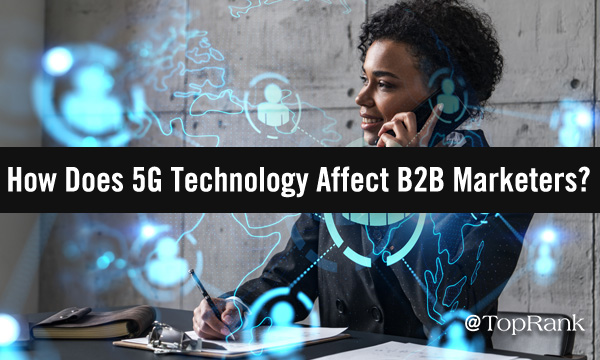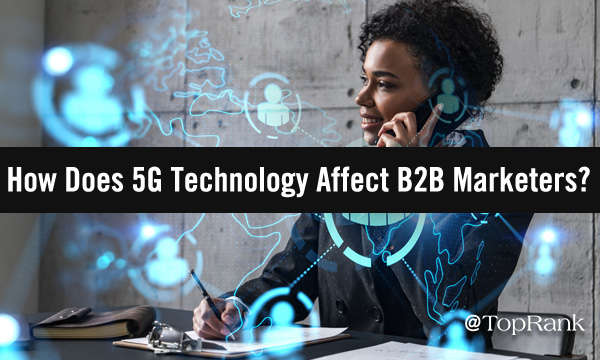Faster Frontiers: How Does 5G Technology Affect B2B Marketers?

 How will 5G technology change the way B2B marketers tell brand stories, and what new opportunities will the speedier forthcoming mobile standard offer? With impacts that will range from slight in some areas to deeply significant in others, the upcoming rollout of 5G cellular network technology is poised to change how the world of B2B marketing operates. “5G will unlock a raft of new applications: IoT, process management, and utility metering for enterprise; and augmented reality (AR) and virtual reality (VR), immersive haptic and 3D holographic experiences for consumers,” Kevin L. Jackson, CEO at GC GlobalNet, recently observed. Let’s take a brief look at what these changes are, and what B2B marketers can expect as we enter a new frontier of freedom from speed limitations in a world that’s more mobile than ever. [bctt tweet=”“5G will unlock a raft of new applications: IoT, process management, and utility metering for enterprise; and augmented reality (AR) and virtual reality (VR), immersive haptic and 3D holographic experiences for consumers.” — @Kevin_Jackson” username=”toprank”]
How will 5G technology change the way B2B marketers tell brand stories, and what new opportunities will the speedier forthcoming mobile standard offer? With impacts that will range from slight in some areas to deeply significant in others, the upcoming rollout of 5G cellular network technology is poised to change how the world of B2B marketing operates. “5G will unlock a raft of new applications: IoT, process management, and utility metering for enterprise; and augmented reality (AR) and virtual reality (VR), immersive haptic and 3D holographic experiences for consumers,” Kevin L. Jackson, CEO at GC GlobalNet, recently observed. Let’s take a brief look at what these changes are, and what B2B marketers can expect as we enter a new frontier of freedom from speed limitations in a world that’s more mobile than ever. [bctt tweet=”“5G will unlock a raft of new applications: IoT, process management, and utility metering for enterprise; and augmented reality (AR) and virtual reality (VR), immersive haptic and 3D holographic experiences for consumers.” — @Kevin_Jackson” username=”toprank”]
1 — New Frontiers Through Freedom From Speed Concerns
via GIPHY Continuing a decades-long evolution in mobile device speed, when the 5G cellular data transmission standard is widely available, it will allow B2B marketers and professionals of all sorts to worry less about limitations imposed by the file size of digital assets — including today’s 4K-and-beyond video and virtual reality (VR) and augmented reality (AR)-related data — and instead spend more time focusing on the creative process of digital storytelling. The speed increase 5G brings is a significant one, and will finally remove some of the last remaining hurdles digital marketers have faced as they craft ever more compelling and immersive online experiences – and the accompanying growth in file sizes and required data transfer times. I’ve been involved in digital communications for over 38 years, and have watched online speeds grow from 110 and 300 baud modems to ever-faster technologies, and with each click up on the transfer speed dial, what can be achieved has also grown. Looking at some of the milestones along the way can help put into perspective just what type of speed increases B2B marketers can expect from 5G offerings coming out from major telecommunications firms in the near future. Here’s a rough overview of the estimated percentage in speed increase seen with some of the changes that have taken place in online data transfer rates since I first went online in 1984 when I began operating a computer bulletin board system (BBS):
- 110 baud to 300 baud: 172.7% increase
- 300 baud to 1200 baud: 300% increase
- 1200 baud to 2400 baud: 100% increase
- 2400 baud to 9600 baud: 300% increase
- 9600 baud to 14.4K baud: 50% increase
- 14.4K baud to 19.6K baud: 36.1% increase
- 19.6K baud to early ADSL: 3981.6% increase
- ASDL to HDSL: 92.5% increase
- HDSL to 2G: 97.4% decrease
- 2G to early 3G: 260% increase
- Early 3G to later 3G:19344% increase
- Later 3G to 4G: 257% increase
- 4G to 5G: 9900% increase
Among these decidedly simplified calculations of basic speed changes over the years, the eventual implementation of 5G technology will represent one of the biggest jumps in download speeds. For the curious, the speed increase we’ve seen from 110 baud in 1984 to 5G in 2022 is a whopping 9,259,260,000 percent boost. [bctt tweet=”“The speed increase 5G brings is a significant one, and will finally remove some of the last remaining hurdles digital marketers have faced as they craft ever more compelling and immersive online experiences.” — Lane R. Ellis @lanerellis” username=”toprank”]
2 — Ushering In Even More Mobile Migration
Another key aspect that 5G technology will bring to B2B marketing is its power to shift even more people to making more of their online lives based on a mobile cellular foundation. 5G is certainly poised to usher in new migration from reliance on land-based data transmission technologies including traditional Internet Service Provider (ISP) fiber, cable, DSL, and other non-mobile formats, to greater adoption of purely cellular communications. When it is eventually implemented to the full capacity of the standard, 5G technology will finally overcome one of the bigger hurdles in humankind’s use and reliance on traditional wired connections, with wireless transfer rates swift enough to conquer the needs of the vast majority of B2B marketers.
3 — Greater Mobile-First Search Advantages
For years Google and to a lesser extent other search engine firms have espoused the importance of tailoring online experiences specifically for mobile audiences, and with the rollout of 5G, the B2B landscape may soon find itself in a truly mobile-first position. When this happens, B2B brands may find a quicker path to some of the mobile-first search advantages than many had envisioned. For B2B marketers, the search engine optimization (SEO) advantages of being compliant with Google’s mobile-first initiatives form a naturally harmonious pairing with the benefits of 5G technology and what it will bring to the table. Google’s nudge to get website owners to implement a mobile-first mindset has been a work in progress for many years now, and the migration continues. Along the way it’s led to some noteworthy changes in how we use the web and communicate. “The ranking advantage gained by mobile-optimized sites spurred the adoption of responsive web design on a larger scale,” Matt G. Southern, lead news writer at Search Engine Journal, recently noted in a look at the role mobile considerations still play when it comes to Google. [bctt tweet=”“The ranking advantage gained by mobile-optimized sites spurred the adoption of responsive web design on a larger scale.” — Matt G. Southern @mattgsouthern” username=”toprank”]
What Does It All Mean For B2B Marketers In A 5G World?
via GIPHY With more speed, greater numbers of mobile users, and a swifter route to mobile-first search advantages, 5G technology is set to deliver important new opportunities to B2B marketers. While configuring my rudimentary 300 baud modem back in 1984 to try eking out an extra few bits per second through the phone lines, I never would have guessed that in 2022 the world would be set to blaze through mountains of data with the speeds that 5G brings. Worlds of new creative possibilities for B2B marketers open up when previous technical limitations can be set aside, thanks to advantages such as those that 5G is set to bring — and although it’s only one step along the way, it’s a mammoth one. Crafting gold medal caliber B2B marketing that elevates, gives voice to talent, and humanizes with authenticity takes considerable time and effort, which is why an increasing number of firms are choosing to work with a top digital marketing agency such as TopRank Marketing. Contact us to learn how we can help, as we’ve done for over 20 years for businesses ranging from LinkedIn, Dell and 3M to Adobe, Oracle, monday.com and others.
The post Faster Frontiers: How Does 5G Technology Affect B2B Marketers? appeared first on B2B Marketing Blog – TopRank®.

